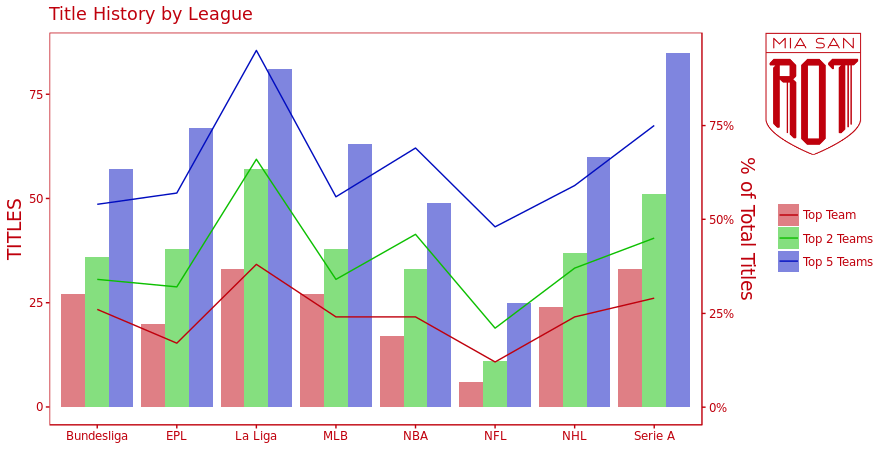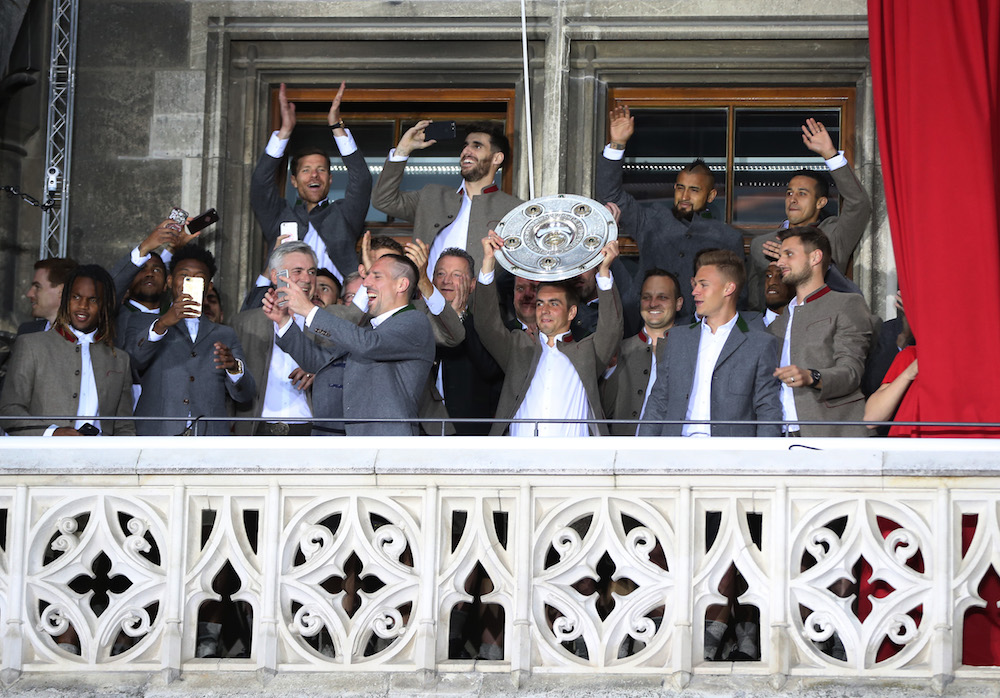Stats & Links: Turning to America for Competitive Balance
The perception is that the playoff system and salary caps currently in place within many of the major sports leagues have created a level of balance that is missing from the European landscape. The real question is, would these ideas be successful in European football?
Playoffs
One popular suggestion is having a playoff system. The logic behind this is obvious. There are surprises almost every year in American sports and very few teams who are able to win titles consistently through the years.
Additionally, in a playoff system, every team who makes the playoffs can dream of winning a trophy as opposed to the two to three teams that usually pop up in the big European leagues. This can provide a level of interest that may be absent for some fans when the league has been decided by February.
While these perspectives hold some truth, they overlook some of the major drawbacks of a playoff system.
Dominate Teams
Firstly, having a playoff system does not eliminate dominate teams. There are plenty of “dynasties” as we call them, in American sports. The Yankees (27) and Cardinals (11) in baseball, Celtics (17) and Lakers (16) in basketball, Steelers (6) Cowboys (5) and Patriots (5) in football and the Canadians (24), Maple Leaves (13) and Red Wings (11) in Hockey have all enjoyed prolonged success throughout their franchises respective histories.
While it is true that some initiatives by their respective governing bodies (MLB, NBA, NFL & NHL) have tried to limit these dominate teams, they have had a limited amount of success. The Patriots have been dominating the NFL for over a decade. LeBron James has led his teams to 7 straight NBA finals. Chicago, Pittsburgh and L.A. have won the last 6 Stanley Cup trophies.
Perhaps most interestingly, baseball has had 8 different champions in the last 10 years. I say that this is interesting because baseball is the sport with the least stringent rules in terms of salary caps and other initiatives to prevent “super teams” or “dynasties.”

Regular Season
Another major disadvantage to the playoff system is what it means for the regular season. The regular season in American sports, is almost completely meaningless. The playoff picture is largely set midway through their respective seasons. While there are usually a few teams battling it out till the last day, trying to get the last playoff place, there are rarely battles for who has the best record.
There is also a lack of motivation for teams to have the best record as their only reward is “Home Field Advantage.” As mentioned previously, LeBron James has made it to 7 straight NBA finals. However, he has become increasingly unconcerned about finishing in first place in the league, choosing instead to save his energy for the playoffs.
In short, the majority of the league has very little to play for in the second half of the season. For the most part the top 8-10 teams have distanced themselves from the pack, the Bottom 10-15 teams are so far back that they have no hope and start tanking for draft picks, which leaves 5-10 teams that are still fighting for a playoff spot.
I often wonder what the point of playing the exhaustive regular season is, when there is no real reward for being the best team over those games. Two years ago the Golden State Warriors won a record 73 games in the regular season but lost to the Cavaliers in the finals. No one cares at this point about those 73 wins because they didn’t win a championship.
There is a general apathy in the U.S. with regards to the team with the best regular season record. No one really celebrates winning their division, other than the fact that they are in the playoffs and have a chance at the real competition.
This is a major deficiency in the operation of U.S. professional sports. Playoffs unquestionably provide a level of excitement for the teams actually involved, but it also seems rather pointless to play a long season full of games that have no meaning outside of how it impacts their ability to make the playoffs.
The European footballing framework has the best of both worlds from this perspective. The team who is the best over a long season and accumulates the most points wins the league. The team who plays well in knockout games and can string together a series of good one off performances wins the Cup.
The DFB Pokal is a competition which every team can hope to win since luck and short term form are significant factors.
That is a balance that works and should not be lost. Bayern have clearly been the best team in the Bundesliga this season. That deserves to be recognized in terms of the league title and celebrated as such.
Bayern’s dominance in the league does not mean however that they will for sure win the cup. While they are the obvious favorites, it would not be shocking if they were to lose to any of the remaining teams in such a format. If they were to win however that should be celebrated in its own right as they are different competitions.
That hits upon the real problem with the playoff system. You are essentially giving out one trophy for two competitions. While it is what we are used to here and it works to some degree, this is not a change that the Bundesliga should be considering.
Salary Cap
The salary cap is another suggestion that gets thrown around quite a bit. Again the logic behind this is obvious. If you limit teams like Bayern to how much they can spend, it levels the playing field for teams who aren’t as financially well off.
In theory this eventually gives everyone a chance to win. The results of these efforts however have been largely mixed. The NFL for instance has easily the most parity. However that has not kept teams like the Patriots and Steelers from largely dominating the league.
As discussed earlier that is not unique to the NFL. The truly troubling thing that is perhaps lost to many who have not regularly watched the NFL over the last decade, is the decline in the quality of play. While for the most part the entire league is competitively equal, there are no teams that play at a truly elite level.
The actual results of the salary cap and parity is league wide mediocrity. Games are riddled with simple errors and inconsistent play. You’ll often see a team look like the best team in the league one week, only to come out and lose to one of the worst teams the following.

(Image by Alexandra Beier/Bongarts/Getty Images)
Parity
Parity in theory is great, but it only works if you have enough talent to maintain a high level of competition. From my observation of the American professional sports leagues, this is not possible. Trading the quality of play for league wide competitiveness seems short sighted.
As the NFL has become more equal, the viewership has also waned. There are of course a variety of factors that play into this, but it is too much of a coincidence to have no correlation.
The other side of a salary cap is: where does the money go if not to the players? Professional sports franchises in America have become printing presses for the owners. Profit sharing and salary caps mean that large chunks of the teams revenue goes directly into the owners pockets.
You can make a case either way as to the where profits for professional sports franchises should go. There has to be a better balance than currently exists in leagues like the NFL and NBA though, where teams make extraordinary amounts of money off of individual players who see comparatively little of that in return.
Competitiveness in Europe
One final issue in regards to the salary caps use in the Bundesliga is how it would affect their ability to compete in Europe. Unless UEFA mandated a salary cap, one league choosing to limit how much their teams can spend on players would significantly damage that leagues ability to compete with the others.
The best players would unquestionably go to leagues where they can make more money, which means that the quality of that particular league would also drop significantly
Evidence of this player exodus can be seen in the individuals who leave Europe for China. These players sacrifice a better league and often their chances of being selected by their National Teams simply because of how much money they are being offered.
The Chinese Super League has been luring talented players from Europe with huge wages despite inferior quality. Introducing a salary cap would likely yield similar results if implemented in any single European league.
There is also the risk that players will manipulate the system to go to certain teams. In the NBA for instance players have worked with each other to enable teams to bring in big talent. Elite players want to play with other elite players and if that can’t happen organically, sometimes they will arrange it.
Additionally, much like Bayern, teams like the Yankees, Lakers and Celtics are and always will be attractive destinations for big stars because of their history. A salary cap does not change that and the marketing and sponsorship opportunities they can get by playing for those teams provides a greater incentive to join them.
The best possible solution here may be something similar to what Major League Baseball operates under. A soft cap where teams that go over have to pay a “luxury tax” based on how much over the cap they spend. This “tax” could then be spread throughout the rest of the league and would provide a deterrent to high spending teams. Again though, all of Europe would need to be on board for this to be practical.
The Need for Super Teams
Ultimately, there is a real question as to whether parity is actually the best thing for sports leagues. From my experience with watching sports of varying levels and organizations, I have come to the conclusion that super teams make sports more interesting.
Who are the teams that are remembered and talked about decades later? It’s the ones that dominate a particular era. The teams that take the game to a new level or accomplish something unique. The “super teams”. The “dynasties”.
The thing that proponents of parity fail to realize, is that every form of entertainment needs a hero and a villain. In Germany, Bayern fills both roles, as is the case in every sports league worldwide.
Leagues like the NFL, where parity is closest to a reality, are getting increasingly boring. When fans go through their schedule, there are no teams left that they can pencil in as the one they “can’t miss”.
Sports after all is entertainment for us spectators, and the worst thing you can say about any form of entertainment is that it is boring. While the league title may not be providing the drama that the people would hope, Bayern is still a team that no one can ignore. Love them or hate them, you will not be indifferent.
Links of the week
Malcom – Can he replace Frank Ribéry and Arjen Robben? | Fussballstadt
Best dribblers: Hazard ahead of Neymar and Messi | CIES Football Observatory
Morata is the best player I’ve ever faced – Kimmich | Goal
Bayern by the numbers: a look at the second half’s start | Bayern Central
Most dominant teams in Europe: Porto at the top | CIES Football
Current Miasanrot articles
FC Bayern Reserves – VFR Garching 2-1 (1-0) | Martin
Three Things We Noticed: SC Freiburg – FC Bayern 0-4 (0-2) | Chris
Episode 21 – Streich Back | Susie
Current statistics and visualizations
You are currently viewing a placeholder content from X. To access the actual content, click the button below. Please note that doing so will share data with third-party providers.









